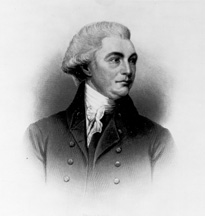William Bingham
| William Bingham | |
|---|---|
 |
|
| President pro tempore of the United States Senate | |
|
In office February 16, 1797 – July 6, 1797 |
|
| Preceded by | Samuel Livermore |
| Succeeded by | William Bradford |
|
United States Senator from Pennsylvania |
|
|
In office March 4, 1795 – March 4, 1801 |
|
| Preceded by | Robert Morris |
| Succeeded by | Peter Muhlenberg |
| 1st Speaker of the Pennsylvania House of Representatives | |
|
In office December 6, 1791 – April 10, 1792 |
|
| Preceded by | Himself (as Speaker of the Assembly) |
| Succeeded by | Gerardus Wynkoop II |
| Member of the Pennsylvania House of Representatives | |
|
In office 1793–1794 |
|
| Personal details | |
| Born |
March 8, 1752 Philadelphia, Pennsylvania |
| Died | February 7, 1804 (aged 51) Bath, England |
| Resting place | New York City, New York, U.S. |
| Nationality | American |
| Political party | Federalist |
| Spouse(s) | Ann Willing |
| Children | Maria Matilda Anne Louisa William |
| Alma mater | University of Pennsylvania |
| Profession | Banker |
William Bingham (March 8, 1752 – February 7, 1804) was an American statesman from Philadelphia. He was a delegate for Pennsylvania to the Continental Congress from 1786 to 1788 and served in the United States Senate from 1795 to 1801.
William Bingham was born on March 8, 1752 in Philadelphia. He graduated from the College of Philadelphia (now the University of Pennsylvania) in 1768.
Bingham first travelled to Europe in 1773, and upon returning to America joined the Philadelphia Society. Sent by the Committee of Secret Correspondence to Martinico, to reside ostensibly as a merchant, and establish communications through that colony with Silas Deane, the committee's agent in France. He departed America aboard the frigate Reprisal on July 3, 1776. During his voyages, he established links with French merchants at Martinique, captured several British ships, and returned in 1777 to America with several full loads of munitions, guns, and other vital goods necessary for the fighting of a war.
By the end of the American Revolution, Bingham was regarded as one of the richest men in Pennsylvania, having made his fortune through joint ownership of privateers and trading. He became a major land developer, purchasing lands in upstate New York and 2 million acres (8,000 km²) in Maine, later known as the Bingham Purchase. With his son-in-law Alexander Baring, he helped broker the Louisiana Purchase.
Bingham was director of several other enterprises. He maintained shipping ventures after the Revolutionary war, through his mercantile house called "Bingham, Inglis, and Gilmore". He was a leading member of the Pennsylvania Society for the Encouragement of Manufactures and Useful Arts, donating a Philadelphia property to be converted into a textile factory.
...
Wikipedia
